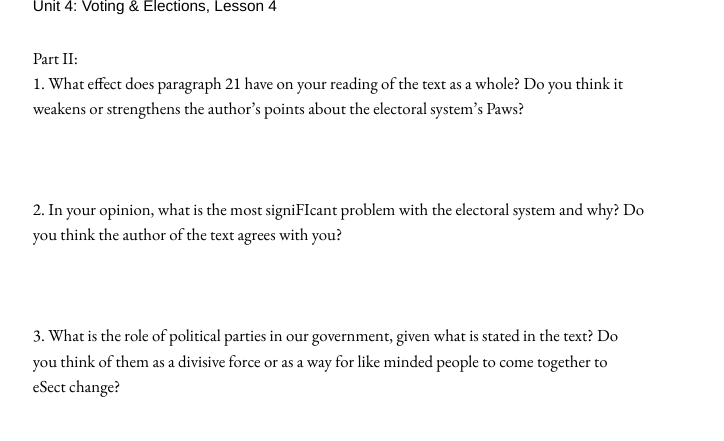1. What effect does paragraph 21 have on your reading of the text as a whole? Do you think it weakens or strengthens the author's points about the electoral system's paws? 2. In yo... 1. What effect does paragraph 21 have on your reading of the text as a whole? Do you think it weakens or strengthens the author's points about the electoral system's paws? 2. In your opinion, what is the most significant problem with the electoral system and why? Do you think the author of the text agrees with you? 3. What is the role of political parties in our government, given what is stated in the text? Do you think of them as a divisive force or as a way for like-minded people to come together to effect change?

Understand the Problem
The questions are asking for analysis and opinion on various aspects of a text related to voting and elections. They require critical thinking about the effects of a specific paragraph, identifying significant problems in the electoral system, and understanding the role of political parties. This will involve interpreting the text and reflecting on personal views in relation to the author's perspective.
Answer
Effect of paragraph 21 depends on content; the electoral system's misrepresentation issue is key; political parties can be divisive or unifying.
Paragraph 21 could either weaken or strengthen the author's points depending on its content and alignment with the overall argument. The most significant problem with the electoral system is often seen as its potential to misrepresent the popular vote. Whether the author agrees depends on their stance in the text. Political parties are usually either viewed as a unifying way for like-minded individuals to enact change or as divisive entities, with the text's specifics guiding the interpretation.
Answer for screen readers
Paragraph 21 could either weaken or strengthen the author's points depending on its content and alignment with the overall argument. The most significant problem with the electoral system is often seen as its potential to misrepresent the popular vote. Whether the author agrees depends on their stance in the text. Political parties are usually either viewed as a unifying way for like-minded individuals to enact change or as divisive entities, with the text's specifics guiding the interpretation.
More Information
The effect of paragraph 21 can vary widely based on its content, providing nuanced support or criticism which echoes throughout the text. The most significant issue with electoral systems, often highlighted, is the discrepancy between the popular vote and actual election outcomes. This remains a contentious point for many authors and debaters.
Tips
A common mistake is failing to evaluate the exact language and context in paragraph 21, which might shift its perceived impact on the overall text.
Sources
- The Good, the Bad, and the Ugly about The Electoral College - monmouth.edu
- PR Library: Types of Voting Systems - FairVote - fairvote.org
- Electoral College | Pros, Cons, Debate, Arguments, Founding ... - britannica.com
AI-generated content may contain errors. Please verify critical information